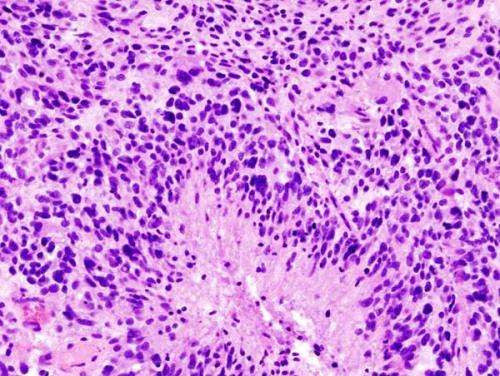by Children’s National Hospital A mouse model of glioblastoma, an aggressive type of cancer that can occur in the brain, suggests that this recalcitrant cancer originates from a pool of stem cells that can be a significant distance away from the resulting tumors. The findings of a new study, led by Children’s National Hospital researchers...
Tag: <span>Brain cancer</span>
TGen identifies immune effects of drug in aggressive ovarian cancer striking young women
SP-2577 could enable the immune system to attack ovarian cancer; clinical trials for patients expected soon THE TRANSLATIONAL GENOMICS RESEARCH INSTITUTE PHOENIX, Ariz. — July 10, 2020 — A drug known as SP-2577 could help enable the body’s own immune system to attack ovarian cancer, according to a study led by the Translational Genomics Research...
Scientists discover that nicotine promotes spread of lung cancer to the brain
WINSTON-SALEM, N.C. – June 4, 2020 – Among people who have the most common type of lung cancer, up to 40% develop metastatic brain tumors, with an average survival time of less than six months. But why non-small-cell lung cancer so often spreads to the brain has been poorly understood. Now scientists at Wake Forest...
The ‘Goldilocks’ principle for curing brain cancer
by University of Minnesota In the story of Goldilocks, a little girl tastes three different bowls of porridge to find which is not too hot, not too cold, but just the right temperature. In a study published in Advanced Therapeutics, University of Minnesota Medical School researchers report on a “Goldilocks” balance which holds the key to awakening...
Existing drug could treat aggressive brain cancer
by Charlene Betourney, University of Georgia A research team from the University of Georgia’s Regenerative Bioscience Center has found that a compound molecule used for drug delivery of insulin could be used to treat glioblastoma, an aggressive, usually fatal form of brain cancer. Glioblastoma, also known as GBM, is a fast-growing, web-like tumor that arises...
Natural killers’ may help treat advanced solid cancerous tumors
by Chris Adam, Purdue University An internal battle over oxygen can lead to major setbacks for people battling solid malignant tumors such as lung and brain cancers. Many solid tumors develop a severe lack of oxygen because they grow into large masses where the blood supply becomes progressively impaired. Cancer cells have adapted to grow in these situations, but immune cells have...
Promising compound selectively kills brain cancer stem cells
Scripps Research scientists have discovered a compound that potently and selectively kills the stem-like cells that make glioblastoma brain cancers so deadly. In a study published this week in The Proceedings of the National Academy of Sciences, the Scripps Research scientists found that the new compound, which they dubbed RIPGBM, kills glioblastomastem-like cells cultured from patients’ tumors with more than 40...
Zika vaccine shows promise for treating deadly brain cancer
September 18, 2018—An international team of researchers has successfully deployed a Zika virus vaccine to target and kill human glioblastoma brain cancer stem cells, which had been transplanted into mice. In a study published this week in mBio, an open-access journal of the American Society for Microbiology, the team shows that a live, attenuated version of the Zika...
Researchers testing new brain cancer vaccine
Rush University Medical Center is part of a new clinical trial testing whether an experimental vaccine can help patients’ immune systems stop the spread of glioblastoma—an aggressive form of brain cancer with very few current treatment options. Glioblastoma (histology slide). Credit: Wikipedia/CC BY-SA 3.0 Led by neuro-oncologist Clement Pillainayagam, MD, the phase II clinical trial...
A ‘homing system’ targets therapeutic T-cells to brain cancer
A multi-institution international team led by researchers at Baylor College of Medicine has developed a new strategy to overcome one of the main obstacles to the treatment of brain cancer—access to the tumor. Under the influence of cancer, the blood-brain barrier diverts immune T cells that attempt to enter the brain to fight the tumor....

